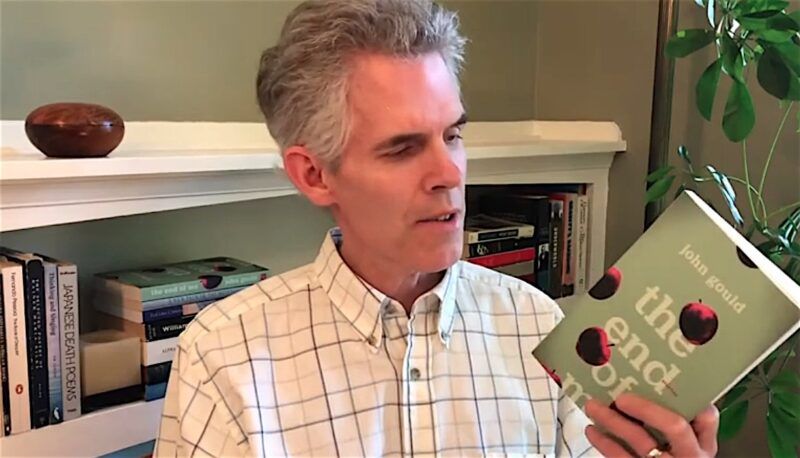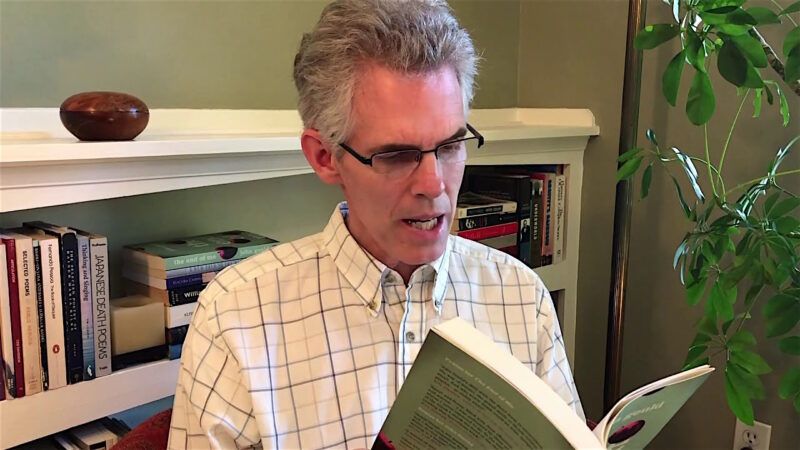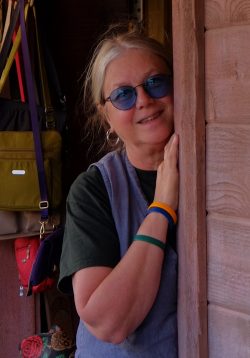#992 Plums, psilocybin, faceplant
The End of Me: Stories
by John Gould
Calgary: Freehand Books, 2020
$22.95 / 9781988298566
Reviewed by Heidi Greco
*
 Every once in a while a book comes along that’s so different, it’s hard to find a tack to take in reviewing it. John Gould’s most recent collection of short fictions presents just such a challenge.
Every once in a while a book comes along that’s so different, it’s hard to find a tack to take in reviewing it. John Gould’s most recent collection of short fictions presents just such a challenge.
About the only book that comes to mind as similar is his earlier publication, Kilter: 55 Fictions. As the subtitle informs us, Kilter consisted of 55 very short stories, but once you finished reading it, you couldn’t help but discover that, like some Rubik’s Cube puzzle, those stories clicked into interlocking place and formed a whole greater than the sum of its parts.
The end of me is similar in that it too is comprised of short fictions, though this time there are 56 of them, all only a few pages long. Although these aren’t as tightly interwoven, they’re united by a shared theme: that great universal equalizer, Death.
While you may think the last thing we need during this pandemic is a book that deals with what we consider a grim topic, in this case, you’d be wrong. Gould’s approach — or rather, approaches — are mostly far from grim. The characters in these stories swing from funeral directors who want you to call them by their first name to kids who toss overripe plums at funeral cavalcades; there’s even an out-of-work guy who decides to become a professional mourner. Cheery stuff, eh.

Yet cheery it actually is. So many of the stories are written in second-person, they can feel like a conversation. And the people you meet in these conversations transcend both space and time. There’s an astronaut in a breaking-down spacecraft; on the other end of time, a would-be suitor to Lot’s daughter (yes, that Lot, the biblical one). And I love that Gould breaks so many rules, writing from the point-of-view of characters he is not: as someone older (or much younger) than he is; sometimes as a female, even as a lesbian hoping to please her new lover.
He plays around with form too. There’s a series of diary entries from 1906, written by a doctor who’s trying to measure the weight of the soul as it departs the body. Or a letter from a long-since-graduated man to his high school band teacher. There’s a grant application for a macabre-sounding art installation. Heck, there’s even a book review (of the online variety, but of course).
And yes, there are Gouldian links from story to story — threads that wander through, poking up now and then. The grant application one is followed by a piece with an art gallery event. Later, an element in a death-experience story, a failed project from school (concerning no less than the mysterious death of Tom Thomson) brings more echoes of art shows, as does an appearance by a “Frida Kahlo look-alike” and irreverent jokes about art — “Saul had wisecracked that ‘muse’ meant ‘somebody an artist bonks, or hopes to’.” The links are infused, and subtle rather than obvious.
Overall, this generally light and very contemporary tone colours many of the stories. Characters refer to “sociopathic media” and “Faceplant.” There’s mention of a novelist who wants to write the greatest novel ever, but “…wants to do this with Twitter.” Yet, there’s a much more serious — even spiritual — undertone riding beneath the surface of much of this apparent playfulness.

There’s a one-sided conversation about fear with an unnamed Christ that makes me think of current experiments using psilocybin to ease people through the fearful aspects of death. There’s a gathering in hell, balanced by a vision of souls in a kind of heaven, a place where “There’s nothing to do … but make things up.” And in a way, maybe if you’re a writer with an imagination as big as John Gould’s, you already live in such a place.
As for reviewing a book as expansive as The end of me, I find myself needing to steal part of an ending from one of his stories to suggest that you go and read it yourself: “You’ve had a long, tough day, what with people like me. Why not give it a try?”
The story that’s from is called “Via Negativa” and it’s one that I liked a lot. It tells us that it can be good for us to swear. Like so many of his stories, it might make you cry on one page and on the next, laugh out loud.
This is a book you can let down your hair to, even if you don’t have hair. Whether you read it from front to back, or by dipping in randomly, you can decide. Who knows, you might want to have some fun and think of it as a choose-your-own-adventure for grownups.
*

Heidi Greco’s next book also deals with death, though through a much different lens. Glorious Birds: A Celebratory Homage to ‘Harold and Maude’ is forthcoming from Anvil Press in spring of 2021.
*
The Ormsby Review. More Books. More Reviews. More Often.
Publisher and Editor: Richard Mackie
The Ormsby Review is a journal service for in-depth coverage of B.C. books and authors. The Advisory Board consists of Jean Barman, Robin Fisher, Cole Harris, Wade Davis, Hugh Johnston, Patricia Roy, David Stouck, and Graeme Wynn. Scholarly Patron: SFU Graduate Liberal Studies. Honorary Patron: Yosef Wosk. Provincial Government Patron since September 2018: Creative BC
“Only connect.” – E.M. Forster
4 comments on “#992 Plums, psilocybin, faceplant”